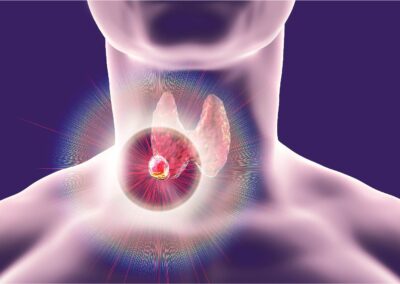According to a 2020 report by the World Cancer Research Fund International, thyroid cancer ranks as the 9th most common cancer worldwide, with a higher prevalence in women than in men. Among women, it is the 5th most common cancer globally. However, in Thailand, thyroid cancer is relatively rare, ranking below the top 10. Despite its occurrence, thyroid cancer generally has a favorable prognosis, with most patients responding well to treatment and achieving complete remission.
Pathophysiology
Thyroid cancer arises from mutations in either:
- Follicular cells, which produce thyroid hormones, or
- Parafollicular cells (C cells), which secrete calcitonin.
Types of thyroid cancer:
- Papillary carcinoma (~80% of cases): The most common type, arising from follicular cells.
- Follicular carcinoma: The second most common, also from follicular cells.
- Medullary carcinoma (5–10% of cases): Originates from parafollicular cells and is more difficult to treat. It is associated with RET proto-oncogene mutations.
- Anaplastic carcinoma: A rare, aggressive form with a poor prognosis and rapid progression.

Diagnosis
Diagnosis is based on pathological analysis from:
- Fine Needle Aspiration (FNA) biopsy of suspicious thyroid nodules, or
- Surgical specimens after thyroidectomy.
Risk Factors
- Radiation exposure, especially during childhood
- Medical professionals with frequent exposure to X-rays or CT scans
- Patients who received radiation to the head or neck
- Family history of thyroid cancer
- Genetic mutations: RET (Medullary carcinoma), BRAF, and RAS genes
ปัจจัยเสี่ยงได้แก่ การสัมผัสรังสี (Radiation) โดยเฉพาะการรับรังสีตั้งแต่เด็ก, ผู้ให้บริการทางการแพทย์ที่ต้องใช้เครื่องมือ X-ray, CT scan หรือผู้ป่วยที่ได้รับการฉายแสงบริเวณใบหน้า, คอ จากการรักษามะเร็ง, ประวัติของโรคมะเร็งไทรอยด์ในครอบครัว โดยเฉพาะการกลายพันธุ์ของยีน RET สัมพันธ์กับ Medullary carcinoma, ยีน BRAF, RAS

Screening
There are currently no universal screening guidelines for thyroid cancer due to its relatively low incidence and high treatability. However, thyroid ultrasound may be considered in high-risk individuals.
Staging & Treatment
Staging is typically based on the TNM system (Tumor size, Node involvement, Metastasis) and treatment follows the NCCN (National Comprehensive Cancer Network) guidelines.
Primary Treatment Options
- Surgery:
- Lobectomy (partial thyroid removal)
- Total thyroidectomy
- May include lymph node dissection if necessary
- Radioactive iodine therapy (RAI): For certain differentiated thyroid cancers
- Chemotherapy, radiation therapy, and targeted therapy: Considered in selected cases

Prognosis
Thyroid cancer is considered highly treatable with an excellent prognosis.
- Papillary, Follicular, and Medullary carcinomas:
- 5-year survival rate is ~99% in early stages
- 90% even in cases with regional spread
- Anaplastic carcinoma:
- Poor prognosis
- 5-year survival rate is approximately 39% even in early stages (American Cancer Society, 2024)
Treatment Side Effects
- Hormone deficiencies (thyroid and parathyroid)
- Disruption in metabolic and calcium balance
- Treated with thyroid hormone replacement and supplements
- Surgical complications:
- Damage to nearby nerves affecting speech and swallowing
- Risk of tracheal weakness postoperatively
- RAI side effects:
- Injury to salivary glands
- Altered taste and smell, dry mouth, dry eyes

Integrative Oncology Approach
Integrative medicine plays a vital role in comprehensive cancer care, focusing on:
- Multidisciplinary therapies: Nutritional therapy, enzyme therapy, ozone therapy, immunotherapy, and cellular therapy
- Goals:
- Enhance treatment efficacy
- Minimize side effects
- Support organ recovery
- Prevent recurrence by addressing underlying cancer causes
- Improve the tumor microenvironment (TME)
- Strengthen immune function
Key supportive strategies:
- Detoxification (liver and gut)
- Reducing inflammation
- Hormonal and metabolic balance
- Bone support
- Intravenous nutrient therapy
- Use of repurposed medicines to boost treatment outcomes


